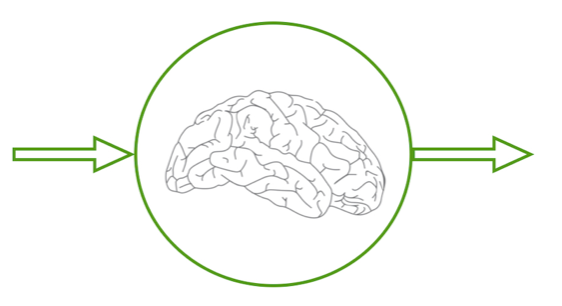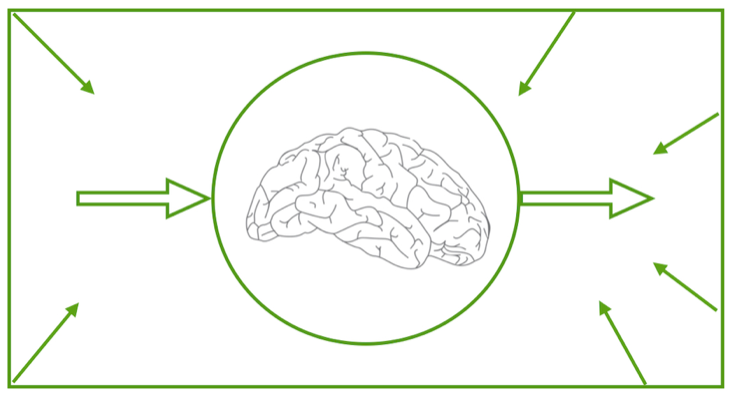L
Cognitive ergonomics / brain ergonomics that everyone can understand – and get results from!
You can increase your productivity by 15-25%, reduce stress and increase well-being.
- Overall productivity growth has weakened in the EU and the US over a long period, especially after 2007 (International Monetary Fund).
- Productivity growth has not been this low for this long, since before the Industrial Revolution, over 250 years ago. (Bank of England).
- Only one in ten workers, on average, consider themselves highly productive despite the introduction of new technologies. In Sweden, it is four out of ten. The survey was conducted in 21 European countries, according to a study initiated by Microsoft. A central explanation is that all the distractions prevent us from getting into a state of flow. (London Business School)
- IQ scores are falling for the first time in almost a century in several countries. Researchers have reviewed tests taken by adults. The steepest drop was among those who were younger.
- ”Instead of experiencing an innovation boom, we are now witnessing stagnation. A meagre result considering that worldwide ”billions of taxpayers’ money have been spent on increasing the country’s knowledge intensity”. (”The Stupidity Paradox”, Mats Alvesson, Professor at Lund University School of Economics and André Spicer, Professor of Organizational Behaviour at Cass Business School, City University London.)
It has never been easier to succeed
It has never been easier to fail. We have built the possibility of failure into technology, environment and culture.
On the other hand, it has never been easier for those who know about the brain to succeed.
Why has it come to this?
It’s obvious. We have brains that work and react in a predetermined way, like nature, whether we like it or not.

Most Companies Today Are Only 80 per Cent Efficient

Most companies and organisations are only reaching 80 per cent of their potential economic viability today – if that. Because of all the distractions.
Why has it become like this? It is obvious. We have brains that work and react in a predetermined way. Whether we like it or not. Just like nature.
That explains why office workers can do five days’ work in four days just like that.
The possibility of being disturbed has increased significantly since the advent of mobile broadband, smartphones, social media, and disruptive environments such as offices, co-working and homes.
A culture of intelligence - the natural step
Fortunately, there’s one factor that remains the same – when everything else seems to be moving at a very high pace – our brain. So naturally, we need to start there. Everything else is crazy.
Most people want change but don’t know how to make it happen
We are introducing the concept of an intelligence-generating culture. In it, everyone knows how our brains work and how it affects our health and performance. We talk about a culture of intelligence. In it, everyone knows how our brains work and how it affects our health and performance.
There is a gap between what science knows and what we do. Cognicopter online training is based on research.
- You will gain in-depth knowledge about when, where and how your brain works at its best. And WHY this is so. You get more done – with less effort. Like a catapult.
- You will also gain in-depth knowledge of how the brain is affected by, for example, multitasking and disruptive environments. WHY it is affected and HOW it affects the results of what you do (writing, creating, et cetera) and your well-being. You get more done – with less effort. Like a double catapult.
- You will gain knowledge that will help you increase your performance and well-being.
- You receive concrete advice and tips from researchers.
You will understand how to think and act in order to use your brain’s full potential. When working in the office, at home or elsewhere.
An intelligence-generating culture is a prerequisite for the office of the future, a sustainable work environment, a digital transformation, skills development, an agile way of working, new leadership and self-leadership. Yes, most things you do and will do in the future.
Based on research in cognitive ergonomics and the human brain
The Cognicopter programme is based on research in cognitive ergonomics and the human brain. It describes how we can improve our performance and well-being by understanding the capabilities of our brains.
It consists of:
- Cognicopter
- A change management training for HR, managers and other change leaders.
National and international nominations and awards
The programme proceeds from Tomas Dalström’s nominated book ”Your Brain from 2008 is More Efficient than the One You Have Today” (only in Swedish). He has interviewed about 50 scientists and other specialists. That has resulted in two books, lectures, and the online training.
He has received national and international awards for nonfiction, journalism, scripts for film/video, multimedia and drama, and innovation.
”It was easy to absorb as a whole and making a change doesn’t have to be difficult.”
The training’s pedagogical models make complex brain functions easy to understand. Most online trainings consist of a talking head and some slides. Cognicopter training includes mini-lectures, 64 videos and animations, texts, researchers’ visuals, concrete advice and tips from researchers, reflection exercises, and a knowledge test with a diploma.
A mix of seriousness, creativity and a dose of playfulness – to stimulate the brain.
You can read what others think about the programme here.
Do you want to be better? Or the best in your industry, in your country, in the world
1.
The six-minute rule: How much do you lose in total in a year?
- If a person’s productivity decreases by six minutes per hour over ten months – due to various distractions – it is equivalent to the amount an organization pays in staff costs for a month’s work.
- Added to that is lost revenue of at least the same amount that should contribute to a company’s profit and common costs. Please note that this does not include the breaks we take to be productive.
- How much do you lose in total in one year?
2.
“I have become more aware of the disturbances that exist, which I have not previously reflected on. And.... now that I can address this, I feel more energized at the end of the day.”
“I took this model created by Tomas as an AHA experience.”
“The course is a good reminder and creates discussion and understanding on how to improve cognitive ergonomics based on scientific facts. And based on that create a better cognitive work environment.”
“We’ve done the training now so we know it’s true. We have received confirmation and support for what we previously just assumed. It has created a discussion.”
“Managers need to lead by example and encourage it. To get coherent time. My interpretation of the research is that if you are interrupted, it takes so long to get back into focus. A lot of notices interfere.”
From a master thesis – part of the Master’s program in Occupational Health Sciences.
You can read more here.
Many companies should learn more about this - both in terms of health and the economyär
”The online training is well thought out and pedagogical. It presents knowledge about the brain in an appealing way that is easy to grasp.
The topic is highly relevant and something that many companies can benefit from learning more about – both in terms of health and finance. I highly recommend the Cognicopter programme.”
Isabelle Sjövall, neurodesigner
Mental coach: "Cognicopter creates behavioural change in the shortest time" I
“I have completed and compared many online training programmes in the health field. We settled on Cognicopter because it created a behavioural change in the shortest time. It gave me positive behavioural change, which is rare for an online course to result in.”
You have succeeded in making the content of the programme easy to understand. We now use the training in our work, and the participants really notice the benefits”.
Fredrik Uddeholt, mental coach and ICC coach, Trippple AB.
Office researcher: Education on how to think and choose a workplace is important
”… that employees are trained in how to think and choose – and how important it is to choose. You can’t move in and think it’s just business as usual, because it really is a change in the way you plan and carry out your work. The employees themselves also have their own responsibility when there are good conditions.”
From an interview Tomas Dalström did with Helena Jancke for Meetings International in October 2018. She is an associate professor of occupational health science and a doctor of psychology. After this interview the idea of the Congicopter programme began to emerge. It took on a broader and holistic perspective.
Dagens Nyheter (Sweden’s largest morning newspaper) published an article with Jahncke and Tomas Dalström titled ”So much worse you perform in a crowded office”, 2023-04-16. The New York Times quoted Jahncke and David Hallman, Associate Professor of Occupational Health Sciences, in September 2022.
3.
The Cognicopter Model© makes complex facts about the brain accessible to understand.
Neurodesigner: Well-thought-out and pedagogical
A video explaining our concept (3.46 min)
”The illustration makes it easy to understand how the brain works and what it takes to work effectively
The model also helps you quickly identify the distractions and select them out to get more results with less effort.”
Sterner de la Mau, Chairman/Founder, MobileLoyalty
The Cognicopter model© shows an ecological system where different brain parts interact and depend on each other. And just like the interaction with nature, you can make good or bad choices.
4.
COGNITIVE ERGONOMICS AFFECTS STRESS, HEALTH AND ECONOMY

Cognition is how the brain takes in, processes, stores and retrieves information. It allows you to direct your attention, sort out what is not essential for the task, plan, organise, solve problems, learn, be creative and make decisions. This is what makes us human.
1. Information enters your brain – input. 2. It is processed. 3. It results in something – output.
For example, 1. Your eyes register that the traffic light is turning red (input). 2. The information is processed. 3. You stop (output).
Briefly on cognition and cognitive ergonomics
Cognitive ergonomics is about the interaction between our human needs and abilities – and our environment, work practices, technology and culture.
It can also be used to develop technologies and working methods – to create better working conditions and efficiency. It is also important for improving the quality of education in our schools, colleges and universities.
Cognitive ergonomics means providing us with better conditions – to utilise the full potential of our brains. We get more done with less effort.

5.

Change management - a training for HR, managers and other change leaders
This training is aimed at those responsible for implementation. You will receive a toolkit comprising researchers’ concrete advice and tips, others’ proven experience and checklists.
Online training and video meetings. It is important to note that this training can only be purchased when several staff members are to complete the Cognicopter training (above).
We know the word "unique" is overused, but we haven't found anything better after more than one thousand hours of work.
About us
Tomas Dalström, a behavioural scientist, has spent thousands of hours trying to understand how the brain works. He has interviewed around 50 researchers and other specialists. His work has resulted among other things in the nominated book ”Your brain from 2008 is more efficient than the one you have today”. You can read what others think about the book here.
National/international awards for journalism, scripts for film and multimedia productions and innovation. He has written texts and scripts for the programme.
Ulf Ziegler is the founder and former CEO for 30 years of one of Sweden’s most successful animation studios with large international clients. They have received national and international awards.
Tomas Dalström och Ulf Ziegler have spent over a thousand hours developing an innovative online training programme.

Contact

Please don’t hesitate to contact me if you have any questions.
Ulf Ziegler: CEO
ulf@heppicopter.com
+46 705774134
Heppicopter is a collaboration between my company Little Big One AB (lbone.se) and Tomas Dalström.
Tomas has written all the texts and scripts for our online training course. I have produced it.
